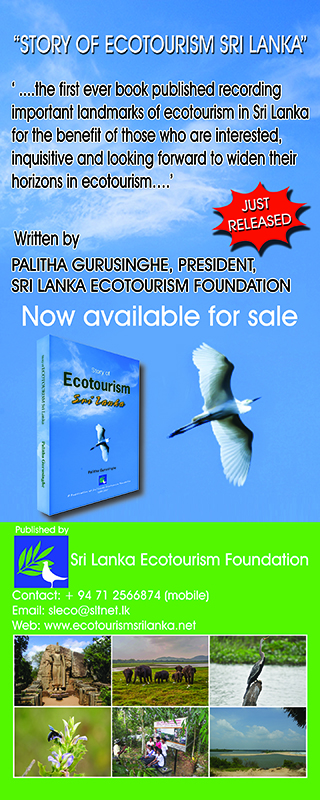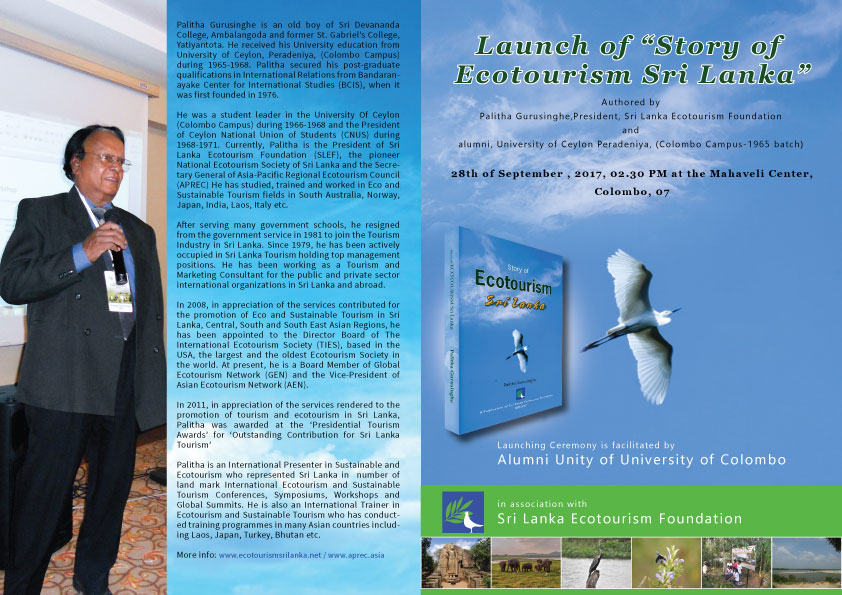Story of Ecotourism Sri Lanka authored by Palitha Gurusinghe, President,
Sri Lanka Ecotourism Foundation, launched
The book “Story of Ecotourism Sri Lanka” authored by Palitha Gurusinghe, President of Sri Lanka Ecotourism Foundation and the Secretary General of Asia Pacific Regional Ecotourism Council (APREC) , has been on Thursday, 28th of September, 2017, at the Mahaweli Center, Colombo 07.
 “Story of Ecotourism Sri Lanka” is written basically from the practical point of view, through the experience gained by the author over the years. Palitha, the founder President of Sri Lanka Ecotourism Foundation and the author of the book thought it is good to record important land marks of Sri Lanka Ecotourism for the benefit of those who are interested, inquisitive and looking forward to widen their horizons in Ecotourism.
“Story of Ecotourism Sri Lanka” is written basically from the practical point of view, through the experience gained by the author over the years. Palitha, the founder President of Sri Lanka Ecotourism Foundation and the author of the book thought it is good to record important land marks of Sri Lanka Ecotourism for the benefit of those who are interested, inquisitive and looking forward to widen their horizons in Ecotourism.
In Sri Lanka, many, even some academics, researchers and most of the tourism officials, government, local government, bank officials, and the tourism stake holders do not clearly understand what Ecotourism is and often mix up the concept with adventure and nature tourism. Therefore, perhaps, to some extent, the information contained in the publication may help academics and students who are perusing their studies and researches in Ecotourism. To the best of the knowledge of the author, this book may be the first publication published on Ecotourism in Sri Lanka.
“Story of Ecotourism Sri Lanka” is a recollection of important land marks of Ecotourism development in Sri Lanka. For the author himself, it was something like ‘Going down the Memory Lane’ of his journey through nineteen years, during which how he involved in promoting Ecotourism in Sri Lanka. Therefore, reading through this book, a reader could get an idea on what Ecotourism is and to what extent
the concepts of Ecotourism and activities are integrated and rooted in to the tourism fabric in Sri Lanka.
In this book, the author has attempted to provide information on the enormous potential the Island possess to position Sri Lanka as an Ecotourism Destination on the world tourism map and also to identify the major issues and challenges that Ecotourism confronted in Sri Lanka. At the same time, he has clearly highlighted on how Ecotourism in Sri Lanka could contribute to alleviate poverty in the tourism
generating areas and support environmental and biodiversity conservation in Sri Lanka.
However, the author is of the view that Sri Lanka Ecotourism is still not developed up to the satisfactory
standards in comparison to our neighboring countries in South Asia, South East Asia and the Pacific Region. To substantiate his views, he has sighted good examples and case studies from some countries like Sikkim, Tripura (India) and Bhutan etc. The author has identified many issues and challenges that Ecotourism in Sri Lanka has confronted. Going through the book a reader could well understand this.
The major setback the Ecotourism has confronted in Sri Lanka is the ‘lack of recognition and contribution’ by the Ministry of Tourism, Sri Lanka Tourism Development Authority and the Sri Lanka Tourism Promotion Bureau. Sri Lanka Tourism Authorities have formulated Ecotourism National Policies, Guidelines and Strategic Action Plans on Ecotourism in 2003, some 14 (fourteen) years ago but has failed to legalize or implement them even today. Due to this, anyone who wishes to embark in the ecotourism business could interpret ecotourism as they wish and the end result would be that the most of these unscrupulous ‘ecotourism developers’ would be resorted to practices of ‘Green Washing Ecotourism’.

